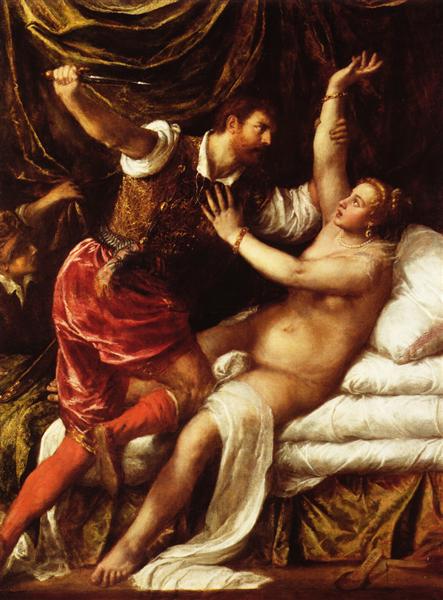Tanım
Titian's Tarquin and Lucretia, painted in 1570, stands as a powerful testament to the Venetian artist's mastery and his ability to capture tragedy and human drama through painting. This piece stands out not only for its narrative content, which is in the tradition of Renaissance art, but also for its masterful composition and sublime use of color, characteristics that have established Titian as one of the great masters of Western art.
In the painting, Titian presents the dramatic episode of Lucretia, an emblematic figure of Roman history who symbolises virtue and fidelity. In the scene, Lucretia is seen, elegantly dressed and with a face that, although marked by anguish, radiates dignity. Her posture, in which she is in a kind of supplication or resistance, contrasts with the figure of King Tarquin, who advances in a threatening manner. Tarquin is represented with a determined look, intensifying the sense of imminent violence and the inevitable tragedy that will unfold.
The composition itself is exquisitely balanced, with a notable use of the diagonal that establishes a dramatic tension between the two figures. Lucretia's attitude, combined with Tarquin's menacing stance, creates a powerful visual narrative that evokes the viewer's emotions. The use of light is also significant; Titian employs a subtle play of light and shadow that highlights the details of the textures of the clothing and skin, giving a sense of volume and presence to the figures.
Colour is another element that deserves special attention. Titian's palette in this work is evidence of his painterly personality, where earthy tones are combined with more vibrant hues, such as the red of Lucretia's dress, which not only attracts the viewer's gaze, but also symbolises her purity and vulnerability. The soft transitions between colours, characteristic of the Venetian style, add an almost tactile quality to the surface of the painting, reinforcing the emotionality of the scene.
This work also reflects the influence of classical and medieval narratives, where the theme of honour and personal tragedy have been recurrent. The story of Lucretia has been a subject of discussion in various literary and artistic works, and Titian delves into this rich background, fusing the stylised representation of the classical ideal with his own vivid and emotional approach.
Furthermore, Tarquin and Lucretia falls within Titian's later period, when he was experimenting with bolder techniques and themes. The painting resonates with the ethos of the time, reflecting social and moral tensions that remain relevant in its contemporary context.
Ultimately, Tarquin and Lucretia not only stands out as a brilliant example of Titian's technical skill, but it also encapsulates a poignant moment in human narrative. Depicting the complexities of power, vulnerability, and dignity in the midst of adversity makes this piece a crucial point in understanding the evolution of Renaissance painting, as well as the deep psychology that Titian instilled in his characters. Its legacy endures, inviting generations of viewers to contemplate not only the quality of the art, but the depth of the human soul it reflects.
KUADROS ©, a famous painting on your wall.
Hand-made oil painting reproductions, with the quality of professional artists and the distinctive seal of KUADROS ©.
Painting reproduction service with satisfaction guarantee. If you are not completely satisfied with the replica of your painting, we will refund 100% of your money.

